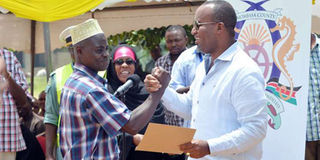Joho cautions against private Islam tutors

Mombasa Governor Hassan Joho (right) congratulates Ali Kimuswa on September 15, 2015, who successfully completed training in Madrassa Early Childhood Programme in Mombasa. Governor Joho has cautioned parents against enrolling their children for Madrasa classes with private tutors. PHOTO | KEVIN ODIT | NATION MEDIA GROUP
What you need to know:
- He said children who are not taught at designated Madrasas easily fall into the traps of bogus tutors who take advantage to radicalise them.
- The programme, which will run for the next five years, will be done based on a needs basis in 100 public and private schools in the County through Madrasa Early Childhood Program Kenya.
- Mr Joho asked nursery school teachers in the County to teach kids thoroughly to enable them to have a smooth transition when joining primary school.
Mombasa Governor Hassan Joho has cautioned parents against enrolling their children for Madrasa classes with private tutors.
He said children who are not taught at designated Madrasas easily fall into the traps of bogus tutors who take advantage to radicalise them.
“This is important because it touches on insecurity. Indoctrination and radicalisation happens because of lack of knowledge among our young people,” said Mr Joho.
IMPOSSIBLE TO RADICALISE
He said children taken to Islamic religious classes from an early age gain the true teachings of Islam and become impossible to radicalise.
The governor added that parents were allowing private teachers with shallow knowledge of Koran to teach their children. In turn, their children end up getting no translation and life in Islam.
“Because these children do not understand the Koran, they easily become susceptible to indoctrination and before you know it, they go to Somalia and return with grenades,” said Mr Joho.
EMPOWERING TEACHERS
He was speaking during the signing of a Memorandum of Understanding with Aga Khan Foundation East Africa (AKF) on the training of early childhood development teachers in the county.
The foundation will provide professional training to teachers, school management committees, communities and education officials whereas the county government will allocate and disburse funds from its budget to facilitate the training of teachers.
The programme, which will run for the next five years, will ensure over 200 teachers have the physical and theoretical skills to promote child-centred learning.
AKF’s Shem Ochola said Aga Khan Development Network’s strategy and motivation for provision of high quality education aims at strengthening the ability of county governments including communities and civil societies, as well as provide high quality but affordable education to middle income families.
TRAIN CHILDREN WELL
The programme, which will run for the next five years, will be done based on a needs basis in 100 public and private schools in the County through Madrasa Early Childhood Program Kenya.
It also aims at supporting the government’s ambitions to create model schools by strengthening school governance systems and encouraging community engagement in schools.
Mr Joho asked nursery school teachers in the County to teach kids thoroughly to enable them to have a smooth transition when joining primary school.
“A class one, two, three child who did not have an opportunity for a clear and strong foundation while in nursery school, mostly reaches class four and cannot even write their name.
IMPROVING EDUCATION QUALITY
It then becomes difficult for them to catch up and compete with other students in the same class who have focused on strong ECDE programmes,” the governor said.
AKF Director for Policy and Partnerships Shem Ochola said the aim of the programme is to improve the quality of early childhood education in the County.
“We hope this initiative will transform the classroom experience of learners and help lift the education standards in Mombasa County,” said Mr Ochola.
The signatories of the MoU who included County Secretary Hamisi Mwaguya and AKF’s Shem Ochola, agreed to ensure quality of ECD through investing in human resources by training in literacy, recruiting new teachers, building model centers and using of Information Communication Technology (ICT) in teaching.
PROVIDING AFFORDABLE EDUCATION
After the training, the teachers are expected to contribute to improved learning outcomes of boys and girls onwards in their schooling years.
Mr Ochola said Aga Khan Development Network (AKDN’S) strategy and motivation for provision of high quality education aims at strengthening the ability of local governments including communities and civil society as well as provide high quality but affordable education to middle income families.





